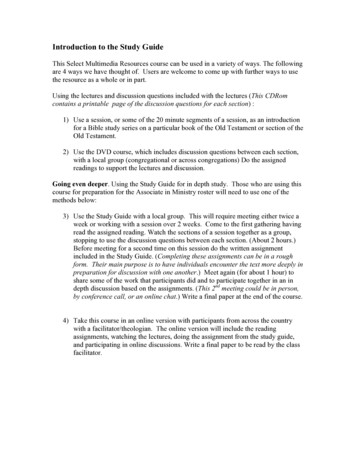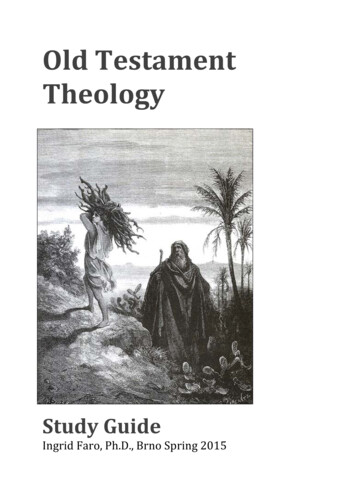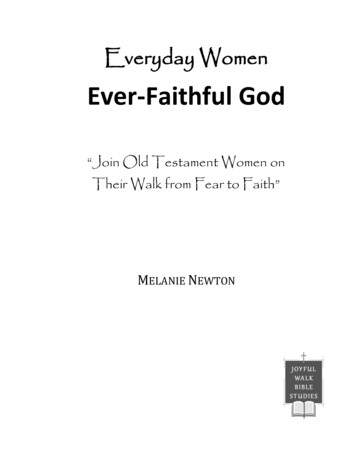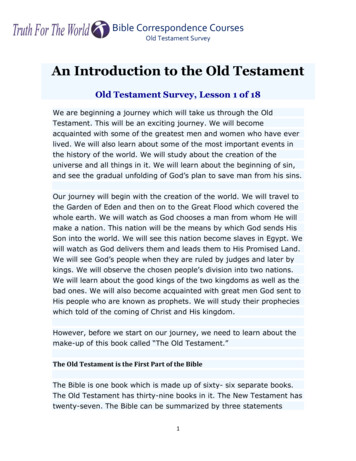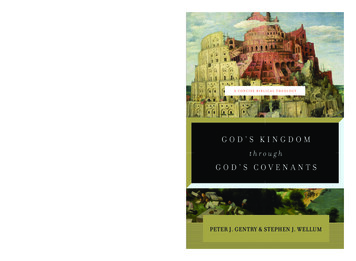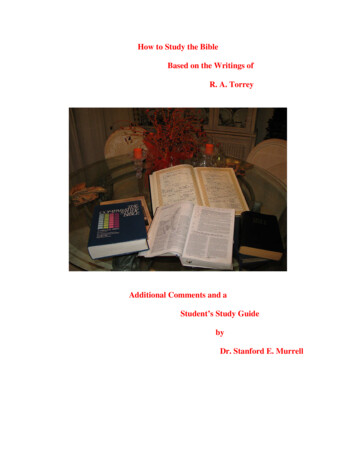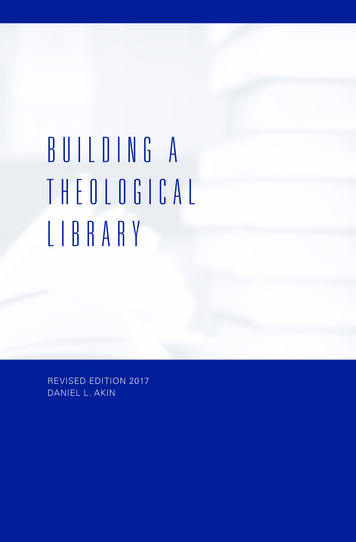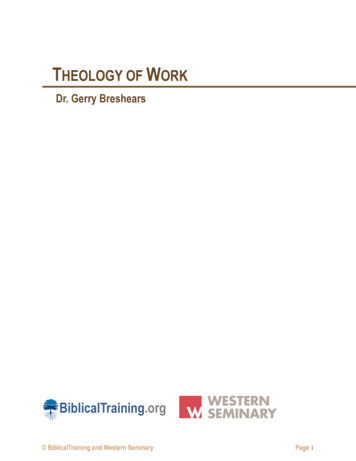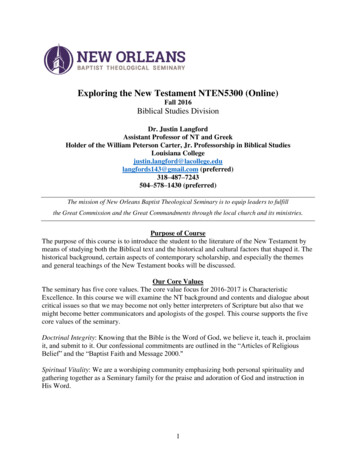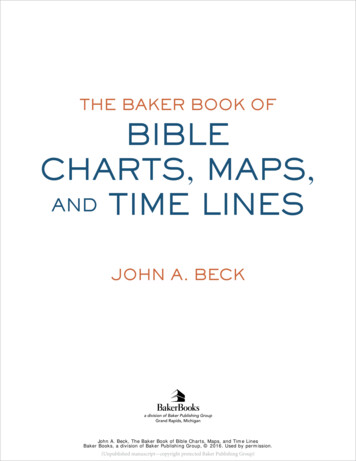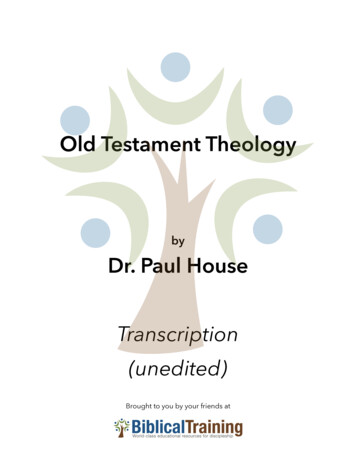
Transcription
Old Testament TheologybyDr. Paul HouseTranscription(unedited)Brought to you by your friends at
Old Testament TheologyDr. Paul HouseTable of ContentsIntroduction3Approaches to Old Testament Theology16Methodology of OT Theology30The Theme of the Old Testament43The Doctrine of Creation58The Purpose of the Law69Law and the Sacrificial System85Law and Faith96The God of History ( part 1)111The God of History (part 2)126Messianic Promises (part 1)138Messianic Promises (part 2)150Servant Passages165Son of Man Theology178Messianic Promises and the NT191Worship202Hurting (part 1)214Hurting (part 2)228Worship is a Unity (part 1)241Worship is a Unity (part 2)252Old Testament TheologyCopyright 2015 Dr. Paul House and BiblicalTraining.orgAll rights reserved. No part of this publication may be reposted on the internet or any other distributionmethod—electronic, photocopy, recording, or any other—except for brief quotations in reviews, withoutthe prior permission of BiblicalTraining.org. This publication may be reproduced and distributed aslong as there is no charge (except for the costs of reproduction), the content is not altered, attribution isclearly indicated, and a link provided back to the course on org/old-testament-theology/paul-house!2
Old Testament TheologyDr. Paul HouseChapter 1IntroductionMy name is Paul House. I teach, starting this fall, at Wheaton College in Wheaton, Illinois. , I will mainlyhave – or be chairing our Department [00:30] of Bible Theology, Archeology and World Religions, May the1st. There are 23 persons in the department, so most of my work will be administrative.I taught at Taylor University for a long time, which is an interdenominational liberal arts college likeWheaton. Taught at Southern Baptist Theological Seminary six hours’ north of here. , most of the placesI’ve lived, it’s hard for me to imagine local being six hours’ north of anything, [01:00] , but it certainly is.And then I’ve taught at Trinity Episcopal School for Ministry the last two years, which has been awonderful experience for me, getting to know the Anglican context a lot better, and so had notanticipated leaving that post, but for a variety of reasons, mostly connected with being closer to familyand ministry and the kinds of decisions you have and will make in your own life decided to make thetransfer to Wheaton.I’m [01:30] a Baptist by background and conviction. , and but have worked obviously [chuckles] withvirtually every other denomination that there is to work with, both in students and as fellow facultymembers.So I have just moved to Wheaton as in they unloaded the truck last Tuesday, we set up householdthrough [02:00] Friday and came here Saturday, recovered a bit Sunday and, well, here we are, and it’salmost nice because the Divinity School’s put us in-in a nice apartment nearby, and that allows us to restand recoup or at least my wife is doing so.I have a wife, Heather, and a daughter, Molly, who is taking third- and fourth-semester Greek thissummer at Taylor University, so, and you say, oh, how is that connected to [02:30] what you’re doing. ,I’m paying for you’re helping me pay [laughter] for – at least you have appreciation for this – third- andfourth-semester Greek this summer, so that’s – that is the process that I’m going through.I have taught Old Testament theology at least as a course at all the institutions where I’ve been, andthat’s-that’s been an interesting experience, [03:00] cuz depending really on your faith commitment, andfor some of you, what your denominational statements state, you-you approach Old Testament theologydifferently.I’ve noticed that-that-that Baptists are kind of all over the map on how they treat the Old Testament.Presbyterians have a fairly set way of doing that if they’re Westminster Confession Presbyterian. Then theAnglicans, at [03:30] least the conservative ones Article 7 of the 39 articles covers pretty specifically someOld Testament hermeneutical issues.So one of the things I’ll be interested to find out, not so that I can spy on you and attack your position, butso that I can hopefully know where you’re coming from, and we can discuss is this-is this notion of-ofhow you’ve been used to approaching the Old Testament and [04:00] its theology. And that also is, ofcourse, affected by who your instructions have been and are now, and so I-I’d like to take that intoconsideration.!3
Old Testament TheologyDr. Paul HouseIf I disagree, I don’t think it will affect your grade [laughter], so I hope-I hope that you can be sure of that.So that-that’s just me, briefly. One thing that you’ll hear me refer [04:30] to, that I’ll tell you one otherthing is I often refer to literary studies because I did graduate degree in in literature before I went intotheology, and it-it did affect my hermeneutical perspective, and more on that later.Let’s look at the syllabus, please, and I hope that the syllabus is clear. If not, we will try to clarify it. Wehave two weeks [05:00] to introduce you to the basic elements of Old Testament theology so that you mayapply it to everything from Alabama law to the Anglican Kenyan church.I hope that we will cover major [05:00] scholars in the discipline, particularly today, and so if today seemsa little heavy on methodology, it is intended to be. It will not be the whole of the course, but we have toset some sort of background for the way people think and for the [05:30] way I’m going to think andteach, and also you’ll find yourself somewhere in the streams of tradition that we’re going to talk about.It will also, I hope, help you understand a whole lot of other biblical scholarship, put some thingstogether. But also, you’ll be reading some of them. , some of the scholars you’ll read will seem very, veryrelevant to what you’re doing. Some will seem a bit technical. Some [06:00] will seem irrelevant to you.That’s inevitable when you have an anthology that’s covering a variety of topics.I hope that what this textbook will do will be to reinforce the things I’m saying in class and supplementthem. I’m not going to read the textbook back to you. That’s just as well.This text is intended to be more theoretical and devoted to methodology as to how these scholars haveapproached their subject [06:30] and how they’ve approached specific subjects. This one is to be moretextual in its approach so that you can understand what’s going on in the biblical books, at least from oneperspective.This book has been used not just in classes, but also by a lot of pastors, a lot of others, and so it’s beenvery interesting to see who’s been using it. I hope it’s not a – just a matter of hubris to use this book, but Iassume that if they asked me to come and teach [07:00] this course, part of the reason was this book andnot “Zephaniah: A Prophetic Drama,”[07:30] one of my other personal favorites [laughter]. So you’rewelcome to that, and you have the reading list that we’ll look at momentarily.I want to familiarize you with the course goals with main currents and Old Testament theology. There isnot one specific way of doing Old Testament theology. I do the best I can to be right, but I also know thatthe subject [07:30] is so vast and the material diverse enough, and the New Testament’s use of thematerial diverse enough that more than one fruitful approach to Old Testament theology exists, and mygoal will be to get you into one of those. I’m not into academic cloning, but I would like for you to have aserious approach that is accurate that you can use.Second, I want to facilitate your [08:00] ability to formulate and write about major topics in Old Testamenttheology. To do that, we’ll have some writing exercises that I’ll describe later. But we’d like you to be ableto formulate into clear prose what you’ve been thinking about and assimilating, and that’s hard to do, bythe way, if you begin to feel some frustration in two weeks.One of the problems with a two-week course is that your opportunity to reflect upon it [08:30] and to letcertain ideas you’ve been having, read about, disputing, accepting, whatever, kind of percolate in yourmind, it’s just not there. So I hope that we can at least begin to do that, but that’s a problem, but – so we’regoing to give you writing exercises.!4
Old Testament TheologyDr. Paul HouseI want to introduce you, three, to the content of Old Testament theology; that is, what the text says andhow we may find theological truths [09:00] there. And fourth, to help you develop a biblical theology forthe variety of ministries that you are working with.Woman: [09:10] [inaudible.][09:11] So the fourth course goal is to develop a biblical theology that will inform your ministry.For instance, at the end of the last class that I had, I had a student who was involved in youth ministry.Wrote a paper on how the Old Testament would give [09:30] him a background, a foundation for teachingyouth what are the things the Old Testament would do about educational and youth ministry. Had thesame done for people who wanted to go into academic work and pastoral work. But again, you’ll need tobe turning that over in your own mind, as you will do, as to how this material works.We have textbooks. The first one, which I’ll put on [10:00] reserve, is from a set, though the set can bepurchased for about 50 now through Crossway Books: “God, Revelation, and Authority,” Carl F. H.Henry. , Henry is a-a-a philosopher and systemic theologian, and I really think the best one Evangelicalshave produced, or actually, with Henry, he helped produce evangelical theology [laughter].So there’s six [10:30] volumes of this so this again will be on reserve tomorrow if indeed the library ownsit, which I can’t imagine they do not. If they do, good. You saw Paul House’s “Old Testament Theology,”which, – and also Ollenburger, Martins and Hasel, “Flowering of Old Testament Theology,” which is nowin its second edition.this book is, as you see, an anthology that includes [11:00] cuttings from major theologians in major eras.The other thing that it does is to give you an orientation chapter at each major section so that as my bookdoes, the first chapter or so is on the background of the discipline.This book also has similar articles, and particularly those of you here who are interested in academicwork, those are articles to master and if you ever go on and have to take comprehensive exams on OldTestament theology of [11:30] any type, those are the kind of articles that become your friend [laughter]because they summarize a lot of material without you necessarily having to read it all, and probably sincewe’ll spend one whole day at least on methodology, those chapters will be your friends when you doyour exams.You do ‘em – if-if you’re gonna be really good in ministry, notice that – or that, particularly the students,you notice that-that suggestion [laughter] that can bring on low-level guilt if you don’t do it. That-that’swell-put. I [12:00] would say if you do have these books checked out, you know, it would be good to putthem on reserve.If you tell me that presents some sort of hardship with you, I’ll probably direct you to the facultysecretary, ask them to Xerox it, the-the sections that are to be read to be put on reserve.I’m certain – well, as I say, we’ll get to that. I’m – the answer is Volume 6 but let me –Man: [12:25] Okay.[12:26] Let me keep what little train of thought I’ve got. Other – but the textbooks [12:30] will worktogether.The other thing is, if you have a particular book you want to work with in your own thinking and readingand it’s checked out, you-you would start with the class. I mean we’re happy to do that, say, who – does!5
Old Testament TheologyDr. Paul Housesomeone have this? Somebody have Gerhart Von Rod’s first volume? I’ve been wanting to read it at night,I just can’t get to it. We’ll be grateful for you to say that you have it.Grading: You have a dual problem or several problems with trying to get a grade in two weeks. Onetheory would [13:00] be, okay, you assign stuff that’s due a long time after the course is over. This createsenduring misery for all involved [laughter].The other thing is to have it done beforehand. This is blue-sky dreaming. This is just absolute fantasy forthe average person though DMin students are having to do it now. So that—that leaves the two-weeksegment that we’ve got.yeah, I could assign you a term paper to be due at the end of time, but that pushes [13:30] me into theenduring misery we’ve already discussed. It also gives some implication that you’ll be able to get up tospeed, work with the course, get everything done in two weeks. Thus that, too, seems to be a bitoptimistic.Then there’s also the notion of just having in-class exams, which, of course, then eats up what little timeyou have in class. This leaves my least favorite version of exams, and this is the [14:00] take-home exam.Why do I not like take-home exams? Because I think they work the best students to death, unless there isa page limit.So I will assign you essay questions. You will limit your answers to no more than four to six typed,double-spaced pages per examination. I will probably give you two essays so [14:30] that you will writeshorter answers.Now how do I guarantee that you just stick to the six pages? I will not read the eighth page. I will notread the eighth page. This is the only way I know to keep it fair for everybody involved. So if you say, butI know a lot [laughter]. I know more than the person over there. In fact, and-and some of you [15:00] say,you know I-I-I want to do this for a living. I want to-I want to go into academics.In academic work, you are often given a word limit for your writing. When this manuscript came in, theysaid, “Cut it.” [Laughter] So we cut it. Oftentimes you get – I have had – was asked to write an article.“We would like,” they said “somewhere between five and ten thousand words of your best.” They do notwant anything longer than that. Or a book review. [15:30] It will be 1,500 words or we will not print it,something like that, so brevity does have its place.So I will give you something like probably tomorrow or maybe at the end of the third day since it’s not –it’s-it’s due at, I think, the start of the fourth period – give you essay questions that you will then work on,and it would be to your advantage to review because the exams will in general be [16:00] over whatalmost the – almost totally over what we cover in class. And if you think what will he ask about, myguess will be the topics of the day.When you take the exam, you’re free to use your textbooks and your class notes, though that is not doingyou a specific favor. I will try to ask the questions of which it will require you to use the content of theclass, but also to adapt your own mind.So [16:30] it will not simply be reading back to me my class notes, which I own a set of [laughter], but itwill be enough of it that I would expect you to , to work through it.!6
Old Testament TheologyDr. Paul HouseUsually a take-home examination results in higher class grades. I’m happy with that. I’m not unhappywith that. So there will be three of these, and it will be my goal certainly to turn them back to you in atimely fashion so that you can see.[17:00] When you type these, do use spell check, do use grammar check. I would penalize the sort ofthings that you can have fixed by a computer. One of the things you can’t have fixed by a computer iscontextual errors. You can spell a-a word-a[18:00] word that it is a word and it be in the wrong context.That is forgivable.You [17:30] will have to teach your computer to spell names of some of these people. That, too, the names,are forgivable, but in general, I do not want to fix your prose. I have taught freshman composition. I’dprefer not to do it again this summer.If English is not your first language, you’re probably ahead of some whose is [laughter], but having saidthat, you know, you-you also are free [18:00] to ask a-a colleague about the content of it, not the contentrather, but is this a clear sentence. , so you’re not to copy off someone else’s content, but you are free tosay, is this a complete sentence, that sort of thing.So I will grade these, and if there is a Beeson Divinity School scale of sorts, I will use it. Otherwise, I’ll justwrite the grade on your paper and you will see. Each one of these will be a third of your grade. [18:30] Soconsistency will be a virtue.I-I assume if you’ve paid for 10 classes, unless something takes you away that’s important, you willattend. I will not email you or mail you the test questions. You must be present to win [laughter].The assignments, you see the reading for today, which if there was a day that I figured that we wouldstick pretty close to the textbook, it would be today because I assumed [19:00] that some of you might nothave done that work, but if you have, you will be right up to speed.Then I’ve picked specific thematic emphases in Old Testament theology that are important to biblicaltheology that are usually important to a variety of ministries. So we’ll start with a method of doing OldTestament theology today, then we’ll move [19:30] to the God who creates. The next two days, days threeand four, we will deal with God and the law.You are to do the reading even if I get behind. You’re to do the reading especially if I get behind, becausethat will fill out what we do not cover in class. So your reading is, in my view, is significant, particularlythe biblical readings [background cough].One nice thing [20:00] about having my own book here is that you can fill out what I would have thoughton a variety of subjects through the reading, and we can have more class discussion perhaps.But the next days three and four, God who saves and gives the law and God who is holy, we’re going todeal with issues of-of law and its relationship to the whole of scripture, which is a rather important topicthroughout the Bible and in [20:30] current life.Day five, the God who rules history. Salvation history is one of the key ways – key components of biblicaltheology and it – and how it’s been treated. Days six and seven will constitute Messianic thought in theOld Testament. This, of course, is a-a primary topic [background cough] in the New Testament, inliturgical [21:00] seasons and in-in appreciating teaching of the church.!7
Old Testament TheologyDr. Paul HouseSome people have raised it to the level of being virtually the only Old Testament theological topic theyknow or discuss. I find this to be unfortunate and very unlike the New Testament church. However[chuckles], it is a vital, vital topic.When you hear me saying Messianic theology [21:30] is not all the Old Testament does, do not hear mesay it is not something the Old Testament does. It is a vital part, but it is not all it does. Or even all that theNew Testament seems to indicate that it does.By day eight. we’ll be moving toward the last segment of the Old Testament, the writings, and into anissue that has gotten some attention in a variety of places, that of worship. Some of you are involved inmusic ministry, some [22:00] of you are involved in planning, you know, not only music but other sorts ofworship. Is there a biblical theological approach to worship, day 8.Day nine, particularly a pastoral issue, one that is covered in some detail in the Old Testament and itstheology, God meeting the hurting. Theology of suffering. And finally, some steps toward a whole biblicaltheology [22:30] and hopefully, that will give you bridges to the New Testament that we haven’t gainedalready.In my view, Old Testament theology is a subset of biblical theology, that if you were to do your jobthoroughly, you would study the scriptures until you were thoroughly acquainted with them, so that ifsomeone said give me four creation – give me creation texts that span the Old and New Testament, [23:00]you would be able to do that on demand, which is sort of like being in ministry, because you havelaypeople who think if they ask you that, you can deliver it, as you know.To quote a friend of mine who is a-a Baptist layman, my church, I asked him how many hours – I was ona curriculum committee, and I said, “How many hours of Bible do you think somebody oughta have?”He said, “I don’t know, but they oughta know it backwards and forwards so that if we ask them anybiblical question, they would know the answer.” Why did he think that? [23:30] , that’s what was kind ofexpected in his profession, what he expects of his doctor [clears throat], his lawyer, his dentist and his –particularly his mechanic [laughter].So they kind of expect that of ministers and so you would-you would do that. You would start. And thenyou would do a thorough study of Old Testament theology and New Testament theology and theirconnections, and from that base, you would-you would do your biblical theology and then take that to asystematic [24:00] theology.And then you would integrate all of that into a system of preaching, teaching, writing, whatever yourministry would be. That would be an ideal, and probably what we’re going to do in heaven is get all thatpieced together [laughter].But that’s how I approach Old Testament theology. That is really one of the first stages in a whole biblicaland systematic theology. You will [24:30] not hear me pitting Old Testament theology against NewTestament theology. You will not hear me pitting biblical theology against systematic theology.I know that is done other places. The seminary I attended one of the famous comments by a systematictheologian [sniffles] was it – or a-a New Testament scholar, he said, “It makes me nervous every time I seea systematic theologian with a Greek New Testament” [laughter].I find this sort of combative spirit to be absurd personally. [25:00] If systematic theology is not biblical,eventually at least then there’s a problem, and if there is not organization to biblical theology, well, it’shard to study. So this is my approach.!8
Old Testament TheologyDr. Paul HouseTherefore, though I would like to use some others, on day two we have Carl Henry, which is Volume 6pages 108 to 119, one of his essays in his Volume [25:30] 6 on creation, and then I believe if the otherHenry is day 10, it’s God, Revelation, and Authority, Volume 2. And I’m trying to see if there are anyothers. I think that may be the only two readings [background talking]. I-I may have to to –Woman: [25:47] [inaudible] articles.[25:49] And it’s on creation.Woman: [25:50] Oh, it is. Okay.[25:51] All right.Woman: [25:52] [inaudible].[25:54] Yeah, Volume 6, interestingly enough is-is where creation comes in his discussion.Woman: [26:00] Hmm.[26:01] The nice thing about Henry is each chapter basically is a self-contained essay, and if you’re notcareful, you’ll think that it’s not a systematic approach then, but then if you actually read a wholevolume, you will see how connected it all is.So do that. I’ll be referring to the article that’s for day 10 today. So we’ll start. I have that with me if you –someone needs to take it and Xerox it.So [26:30] these are the assignments you are to-to read each day, the assignment, and if it looks like thebiblical texts are a hodgepodge to you right now, hopefully once we do our methodological discussion,you will see why the biblical assignments are as they are. If it all seems a hodgepodge at the end, eitherI’ve not done a good job or you haven’t paid attention [laughter], one [27:00] or the other.So let’s begin. If there are any other questions – let me see one other thing in my mind. On day three ittells you the first examination, which covers the first three of – three days of class, is due, is due [laughs] –typo – at the beginning of day four. So at least by day three I will give you the exam questions, and thenyou will bring [27:30] them day four.Second exam will be given you at day six, due the next day. I had hoped to be able to do something withthe weekend, but it just doesn’t go that way. I will give you the final examination at the end of day nine,so it’s just three days, three days, three days and the final.So, again, it-it [28:00] – there’ll be a certain rhythm to this. Hopefully, it will be a comfortable rhythm. Ifnot, it’ll be over in two weeks [laughter]. So I’d like for you to to get a Bible, and I want to start with a bitof a personal journey description of it to help [28:30] you understand how I came about the study of-ofOld Testament theology. And I think these are relevant points for us all.Like some of you probably, I-I had Christian parents, and dedicated Christian parents, one of whom iswith the Lord now and has been for nearly 20 years and one who continues on teaching adult Sundayschool for years and years and [29:00] years, who my father committed to-to-to teaching God’s word.So I grew up in a home in which the Bible was important. We attended Baptist church, but my motherhad been Methodist before, and all of her people were Methodist. I’m not sure about all of their localpractices. They did not practice infant baptism. They were not Wesleyans or Free Methodists. The church[29:30] is still there, but I did not know for many years that Methodists practiced infant baptism becausemy mother’s church did not.!9
Old Testament TheologyDr. Paul HouseMother became a Baptist and because at – there were at least denominations represented [backgroundnoise – cough] in the family, there was always strong respect for other traditions. So my dad early onwould ask one question about other denominations: Are they Bible-believing people? He had no use forthe non-Bible-believing [30:00] people, or very little, [30:00] [30:30] except to the extent that he wanted tohelp reform them [laughter], but that’s really where he started.I was called to ministry when I was 12 years old and at that time my dad gave me two bibles: a Scofieldreference Bible, which he always carried, and a New English Bible, which was just come out in ModernLanguage, Modern Language Edition.Since then I’ve – the kind of poles of my theology have been the Anglican church [30:30] and right-wingdispensationalism [laughs] so somewhere-somewhere out there have-have kind of been the boundaries,kind of like this class [laughter][31:00] .So I began reading the Bible and asking questions about it, and even earlier I remember asking my fourthgrade Sunday school teacher how were people saved in the Old Testament? How did they-how did theyget right with God? How were their sins forgiven? And my teacher [31:00] said they kept the TenCommandments.Now, that made sense to me until I read more of the Bible. You know, you read something like Romans 3,“none righteous, no, not one can conclude with Paul’s comment that all of sin and come short of the gloryof God.”And then as I-I read a little bit longer, I realized Paul wasn’t – that wasn’t Paul’s opinion. Romans 3:10and following there’s a whole bunch of quotations from the Old [31:30] Testament itself, so the OldTestament didn’t think that people were saved by teaching the Ten Commandments or its testimonyabout itself was we all went to hell then.Woman: [31:39] -hmm.[31:40] So I came to this first scholarly decision that either my Sunday school teacher was wrong or astraightforward reading of the Bible was meaningless, so I had to choose between my teacher and theBible and-and also I-I said, well, [32:00] I would[32:30] [33:00] [33:30] choose my – choose the Bible.It was also-it was also helped by the fact that about then he defected to the Church of Christ, so you knowit was easy to-to-to write his opinion off [laughter], but at that point, and then you start reading texts likeHebrews 11. What’s it say about the people there. Hebrews 11, anybody know what that chapter is about?Man: [32:22] [inaudible].[32:22] Right [inaudible] [32:22]. And is that-is that a whole bunch of New Testament people there it’stalking about? No. One by one, [32:30] you know, under the theme without faith it’s impossible to pleaseGod, this person pleased God, this person pleased God, this person pleased God.That’s pretty interesting because it includes some pretty odd folks, particularly in the list at the end. , itwas by faith. And then you’d ask questions about the Old Testament and along the way you’d read a textlike, you know, Second Timothy 3, you know this one? Second Timothy 3 when Paul writes [33:00]something like, oh, start with Verse 14, Paul having told them that the evil men are going to proceed andget worse and worse and worse and worse and worse.Says in Verse 14, “You, however, are continuing the things you’ve learned and become convinced of” – Ialways read from the New American Standard for better or for worse – “knowing from whom you have!10
Old Testament TheologyDr. Paul Houselearned them and that from childhood you have known the sacred writings, which [33:30] are able to giveyou the wisdom that leads to salvation through faith which is in Christ Jesus. All scripture that Godbreathed is literal translation and profitable for teaching, for reproof, for correction, for training inrighteousness.”Now so there’s been a qualitative statement about scripture as God breathed and a statement of“usefulness, profitable for teaching, for reproof, for correction, for training in righteousness.” Now, eh,what is striking here is that the [34:00] all scripture he’s talking about is the Old Testament, correct? Andthat what’s – , a teacher said to me – I forget who or I’d give credit – said really, you know what’s-what’sastounding is the-the New Testament church did all of its evangelization, discipleship, church growthand everything from the Old Testament.So I started asking – I remember way back, I started [34:30] asking questions. What if Paul’s right? What ifhe’s right? All scripture is God-breathed, which I came to pretty early and never left. If you want to readmy – understand where I’m coming – for my doc
Old Testament Theology Dr. Paul House Chapter 1 Introduction My name is Paul House. I teach, starting this fall, at Wheaton College in Wheaton, Illinois. , I will mainly have – or be chairing our Department [00:30] of Bible Theolo
